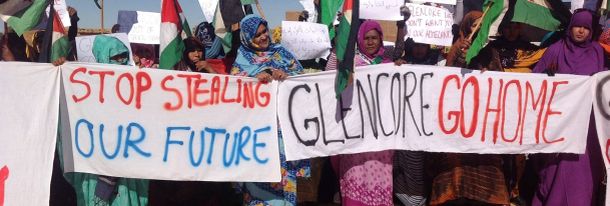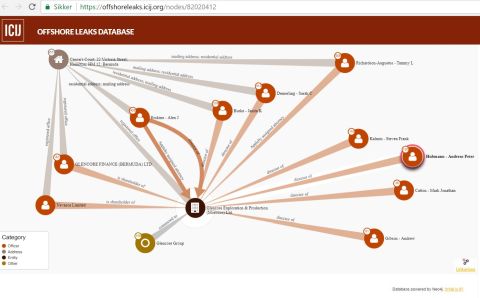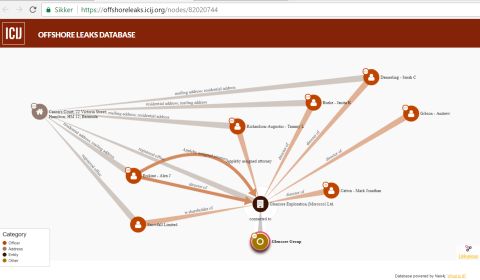
Fresh leaks from international tax-havens provide more information about who is behind the Glencore oil operations in occupied Western Sahara.
The Swiss multinational Glencore has over the last years been blacklisted by several institutional investors for its exploration programmes in occupied Western Sahara. The former UN Legal Counsel has stated that Glencore violates international law through these operations. The company currently holds the operatorship of the so-called Boujdour Offshore Shallow block, off Western Sahara, signed by the Moroccan government.
Morocco, Glencore’s partner, holds that territory under foreign occupation, and refuses to cooperate with the UN to settle the conflict.

Directors: Andrew Gibson, Mark Jonathan Caton, Andrewas Peter Hubman, Steven Frank Kalmin, Sarah C Demerling, Janita K Burke, while its assigned Appleby attorneys are Tammy L. Richardson-Augustus and Alex J. Erskine.
The company is found in ICIJ's database here.
The structure was according to Le Desk established in November 2014, and is constructed as follows (each company owning 100% of the other): Glencore International PLC (in Jersey), Glencore International AG (in Switzerland), Glencore Group Funding Limited (in the Emirates), Glencore Finance (Bermuda) Ltd, Nevasca Limited (in Bermuda), Glencore Exploration & Production Ltd.
Glencore has responded positively to the critique from its concerned owners. Earlier this year, following intense shareholder pressure, Glencore announced to Swiss media that it had sold its interest in Foum Ognit block where it held a minor interest. At the same time, it promised in that it would also sell its interest in the block which it operates, the Boujdour Offshore Shallow. After one year of talks with Morocco, there is no news on that front.
The International Consortium of Investigative Journalists (ICIJ) and its Moroccan partner, the newspaper Le Desk, has now offered new information on how the Glencore has structured its operations in the territory. ICIJ has made accessible a searchable database with data from leaked documents from the lawfirm Appleby, a firm which facilitates international company registrations in tax-havens. The leak, consisting of 1,4 terrabytes of documents, reveal numerous Glencore controversies in operations all across the globe.
Theses graphics show two Glencore companies associated to the Western Sahara work.

Download image
Directors: Andrew Gibson, Janita K. Burke, Sarah C. Demerling, Mark Jonathan Catton, Alex J. Erskine, while its assigned Appleby attorneys are Tammy L. Richardson-Augustus and Alex J. Erskine.
The company is found in ICIJ's database here.
The structure was according to Le Desk established in September 2014, and is constructed as follows (each company owning 100% of the other): Glencore International PLC (in Jersey), Glencore International AG (in Switzerland), Glencore Group Funding Limited (in the Emirates), Glencore Finance (Bermuda) Ltd, Snowfall Limited (in Bermuda).
In a larger article about Glencore's operations in Western Sahara on 10 November 2017, Le Desk has furthermore published a section of one draft Word document, from November 2014, entitled "POWER OF ATTORNEY" with the letterhead of Glencore Exploration (Morocco) Ltd. The document states:
"We, Glencore Exploration (Morocco) Limited, a company duly organized and existing under the laws of the Island of Bermuda, having its registered office at Canon's Court, 22 Victoria Street, Hamilton, HM 12, Bermuda (company), HEREBY CONSTITUTE AND APPOINT [IAIN HIGNELL] and/or [SHAUN CHANDE] (collectively, Attorneys), to do the following acts and things in the name and on behalf of the Company with full power or substitution and revocation: to act as the Company's representative and alternate representative, respectively, for the purposes of the petroleum agreement, association contract and joint operating agreement to the Boujdour Offshore Block, Morocco, with full powers".
It is not known whether the draft document was ever concluded and signed.
Le Desk refers to track-changes made in the 'power of attorney' Word file draft, suggesting that these changes indicate that the company wanted to disassociate itself from the ownership of the controversial oil block in case the pressure from investors to blacklist the company, or the media attention, would intensify. In particular, Le Desk refers to changes done in the letterhead of the document. WSRW believes that the track-changes could be read differently, and that the amendments to the document do not indicate that the company had intention to obfuscate anything in - or with - the document itself.
The document has, even after the changes done to the document, a clear Glencore letterhead, and the two individuals given the attorney rights, Mr. Hignell and Mr. Chande, both have backgrounds in Glencore.
The newspaper also questions the motives of the establishment of the structure.
“According to the documents obtained by Le Desk (…), Glencore together with the lawfirm Appelby (…) set up two options, one in September 2014, and the other in November the same year, via shell companies located in various tax-havens, thus allowing them to cover their tracks, notably via a company with the name of Snowfall Limited, created for this purpose on Bermuda. Was this a way to construct a façade under a phony name?”, Le Desk asks.
WSRW cannot immediately see from the information published that the purpose of the establishment of the two synonym-named Bermuda companies Nevesca Ltd and Snowfall Ltd was to hide Glencore's true ownership over the licences.
The Moroccan newspaper TelQuel on 10 November quoted the Le Desk story by stating that Glencore has secretly transferred its minority stake in the Foum Ognit to itself via the Jersey-registered company New Age, and that Glencore could thus still be owning interest in Foum Ognit. WSRW sees no reference in the Le Desk story regarding this allegation.
Confronted by Le Desk, Glencore responded that it is « in discussion with ONHYM to abandon the Boujdour Offshore Shallow block, where it holds 38,25 of the interest ».
More than one year has now passed since WSRW first received information that such talks were taking place. It is not known when, or if, these talks will end.
Swedish government pension fund engaged with Glencore
The Council on Ethics of the Swedish government pension fund explains in its latest annual report for 2017 that it had engaged in a dialogue with Glencore regarding Western Sahara – and that this dialogue now is finished.
Glencore has left occupied Western Sahara
The final assets that Glencore held in oil exploration in occupied Western Sahara have been sold.

